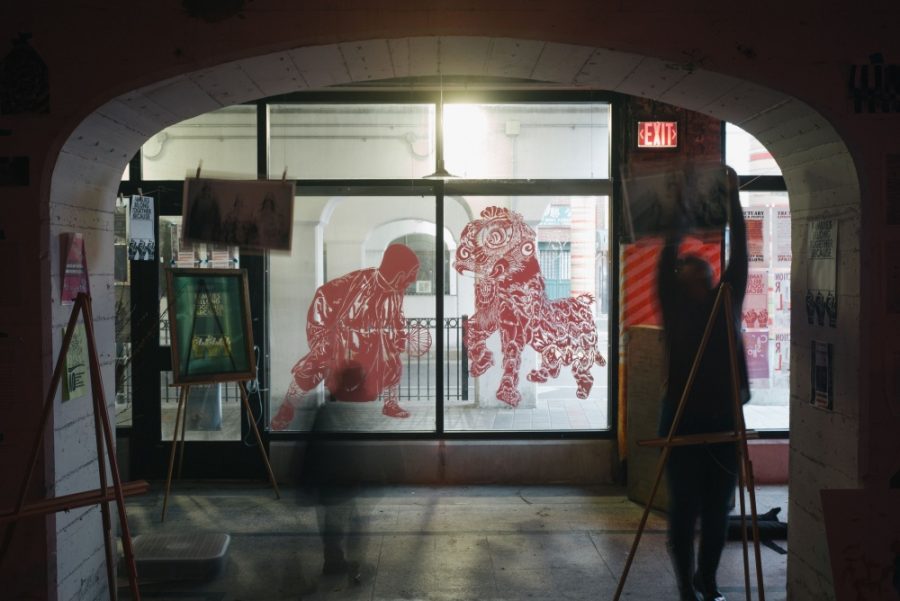Axis Lab interprets intersectionality, Asian American identity through arts and mutual aid
Arts and mutual aid organization Axis Lab seeks to center immigrant and refugee voices and address issues within the Asian American community.
April 26, 2021
When Asian American studies Prof. Patricia Nguyen co-founded Axis Lab in 2015, she felt as though she inherited the organization.
Even though the Argyle-based mutual aid and arts group is less than a decade old, Nguyen said she drew a lot of knowledge from her father, who has organized in the district for more than 40 years.
“(The nonprofit) that I co-founded is actually one that wouldn’t have been possible without my father,” Nguyen said. “Even though it’s run by a lot of us millennials, it’s actually an intergenerational project.”
Axis Lab was formed by a group of creatives — many first- and second-generation Asian Americans — to serve the predominantly Southeast Asian district of Argyle.
Through arts, design and food, she said the group seeks to center immigrant and refugee voices and address inherited trauma, anti-Blackness, gentrification and other issues within the Asian American community.
John Lee, Axis Lab co-founder and director of design, said even though he grew up in southern California, he is able to see how the group’s work attempts to branch the experiences of Asian Americans across the nation.
Lee said Axis Lab seeks to be “hyperlocal” to the needs of the Argyle district, but said he is able to see connections between Asian American communities in their histories of U.S. intervention and imperialism.
“Argyle is so unique to everything else,” Lee said. “There’s an opportunity for us to not only tell specific stories of our communities here, but things that also tie into the larger, broader struggles many people are probably faced with.”
Axis Lab addressed this proximity and intersectionality through artistic lens. In 2019, the group highlighted neighborhood history through “In Search of Old Dreams: Stories of Argyle,” in partnership with Chicago Architecture Biennial.
To prepare the installation, Axis Lab members looked up old articles on the neighborhood and found coverage of anti-Asian racism, housing discrimination and police brutality as well as those that covered Vietnamese families moving into the neighborhood, Lee said. Axis Lab members then converted these old newspaper articles into a canvas form.
However, Axis Lab’s activity shifted to “rapid response” last summer, Caroline Olsen (Medill ‘17) said.
Olsen, who collaborates as documentarian and community archivist at Axis Lab, said that organizers set up a mutual aid booth under a Red Line stop every week after Chicago school food programs shut down, distributing food, personal protective equipment and COVID-19 informational packets.
Then, organizers got the idea to create a “story booth” within the mutual aid booth, Olsen said.
“I would talk with people and take portraits for them on the street if they were interested,” Olsen said. “(We would) just hear the story of how them or their family ended up in the neighborhood, and how they’ve seen it change over the years, and sort of get these personal narratives of the history of the neighborhood.”
At the end of the summer, Axis Lab printed out quotes and portraits of local residents and exhibited them outside a closed grocery store, and gave the photos to people who were in them, Olsen said.
The project felt like it was building a community, she added.
Nguyen said she also sees the work of her organization as having educational and healing capacities. By incorporating ethnic studies with the arts she said she wants to prioritize access to education on top of rapid-response initiatives.
“How do we provide healing and educational workshops that are more accessible to the community?” Nguyen said. “We want to make sure that everybody has an opportunity to participate.”
Email: [email protected]
Twitter: @YunkyoMoonK
Related Stories:
— Northwestern’s Asian American communities look beyond the University for healing
— Women’s Center prioritizes mutual aid education in year of learning
— A year into pandemic, NUGW is still advocating for sixth-year funding


